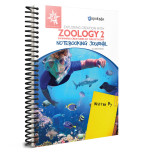We use cookies to make your experience better. To comply with the new e-Privacy directive, we need to ask for your consent to set the cookies. Learn more.
Exploring Creation with Zoology 2: Swimming Creatures will immerse children in ocean anatomy, habitats, and aquatic life. Students should be familiar with the classification system and binomial nomenclature before diving into the watery depths to discover all the strange and unique creatures of the sea, lakes, and rivers. If students are unfamiliar with the classification system, the publisher recommends they complete Lesson 1 of Exploring Creation with Zoology 1 (available for free here). Purchase of the course includes a link and password to the Apologia Book Extras site which provides additional learning content. The Textbook includes all the student readings, instructions for creating an “ocean box”, and neat experiments like discovering the insulating power of fat, starting an aquarium, raising Triops, plus more. An appendix includes the supply list for all the activities (organized by lesson) and an answer key to the What Do You Remember questions from each unit. An optional, consumable Notebooking Journal provides additional learning activities for ages 5-11. Books are sold individually, or in a convenient set. We also offer an optional Apologia Zoology 2 Lab Kit from Nature’s Workshop for your convenience. Please note, the 2nd edition is not compatible with the 1st edition, as the new edition includes an additional lesson and revised lesson order. ~Deanne





